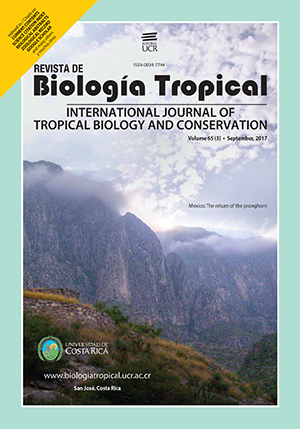Abstract
In Mexico, the Gleicheniaceae family is represented by different species such as Dicranopteris flexuosa, Diplopterygium bancroftii, Gleichenella pectinata, Sticherus bifidus, S. brevipubis, S. palmatus and S. underwoodianus. Currently, few studies have described the gametophytes of some species in this family, and our objective was to contribute to the knowledge, and to describe and compare different aspects of their germination, gametophyte development, and to determine if the prothallus characters are useful for taxonomic delimitations in the group. For this purpose, specimens and spores of each taxon were collected in the field, spores were sown in Petri dishes containing agar and Thompson nutrient medium, and grown in a plant growing chamber under controlled conditions of light (12 hr light/darkness), (50 %) humidity, and temperature (18 °C night, 25 °C day). Additionally, observations of fresh materials were made and photomicrographs were taken using both optical and scanning electron microscopes. Our observations allowed distinguishing two types of germination Gleichenia and Cyathea; and three types of prothallial development Marattia, Osmunda and Drynaria. Gametangia presented more than three cells, and this is considered a primitive feature by other authors. As some variations in the germination type were observed and have not previously been reported in the literature for this family, and because of the heterogenity in the patterns of the prothallial cell development, and gametangia of more than four cells, it is important to broaden the study to other species, in order to determine the taxonomic value of the morphological characters of the gametophyte, as well as to determine if these variations are present in other species of the family.
References
Atkinson, L. R. (1973). The gametophyte and family relationships. Botanical Journal of the Linnean Society, 67 (Suppl. 1), 73-90.
Atkinson, L. R., & Stokey, A. G. (1973). The gametophyte of some Jamaican
thelypteroid ferns. Botanical Journal of the Linnean Society, 66, 23-36.
Campbell, D. H. (1908). The prothallium of Kaulfussia and Gleichenia. Annales do Jardin Botanique de Buitenzorg, 7, 69-102.
Chambi, J. C., Cardozo, R. M., & Martínez, O. G. (2013). Germinación de esporas y gametofitos de Polystichum montevidense (Spreng.) Rosenst. (Dyopteridaceae). Botanica Complutense, 37, 47-52.
Christenhusz, M. J. M., & Chase, M. W. (2014). Trends concepts in fern classification. Annals of Botany, 113, 1-24.
Erdtman, G., & Sorsa, P. (1971). Pollen and Spore Morphology, Plant Taxonomy: Pteridophyta (pp. 66, 69, 84, 92, 176). Estocolmo: Almqvist & Wiksells.
Farfán-Santillán, N. (2014). Viabilidad de esporas y desarrollo protálico de las especies mexicanas de la familia Gleicheniaceae (Tesis inédita de maestría). Universidad Autónoma Metropolitana, México, D. F.
Farfán-Santillán, N., Mendoza-Ruiz, A., Pérez-García, B., & Velázquez-Montes, E. (2016). Palinología de las especies mexicanas de Gleicheniaceae. Botanical Sciences, 94(2), 281-289.
Haufler, C. H., & Adams, W. W. (1982). Early gametophyte ontogeny of Gleichenia bifida (Willd.) Spreng. Phylogenetic and Ecological Implications. American Journal of Botany, 69, 1560-1565.
Klekowski, E. J. Jr. (1969). Reproductive Biology of the pteridophyta III. A study of Blechnaceae. Botanical Journal of the Linnean Society, 62, 360-377.
Kramer, K. U. (1990). Gleicheniaceae. En K. Kubitzky, K. U. Kramer, & P. S. Green (Eds.), The Familyes and Genera of Vascular Plants, Volume I: Pteridophytes and Gimnosperms (pp. 145-152). Germany: Springer-Verlag.
Lugardon, B. (1974). La structure fine de l’exospore et de la périspore des filicinées II. Filicales. Commentaires. Pollen et Spores, 16, 161-226.
Mehltreter, K., Walker, R. L., & Sharp, J. M. (2010). Fern Ecology. United Kingdom: Cambridge University Press.
Mickel, J. T., & Smith, A. R. (2004). The pteridophytes of Mexico. Memoirs of the New York Botanical Garden, 88, 1-1054.
Nayar, B. K., & Kaur, S. (1969). Types of prothallial development in homosporous ferns. Phytomorphology, 19, 179-188.
Nayar, B. K., & Kaur, S. (1971). Gametophytes of homosporous ferns. The Botanical Review, 37, 295-396.
Pérez-García, B., & Mendoza-Ruiz, A. (2004). A contribution to the gametophyte morphology and development in several species of Thelypteris, Thelypteridaceae. American Fern Journal, 94, 143-154.
Punt, W., Hone, P. P., Blackmore, S., Nilsson, S., & Le, T. A. (2007). Glossary of pollen and spore terminology. Review of Paleobotany and Palynology, 143, 1-81.
Smith, A. R., Pryer, K. M., Schuettpelz, E., Korall, P., Schnider, H., & Wolf, P. G. (2006). A Classification for Extant Ferns. Taxon, 55, 705-731.
Stokey, A. G. (1945). The gametophytes of Dipteris conjugatum. Botanical Gazzete (Crawfordsville), 106, 402-411.
Stokey, A. G. (1950). The gametophyte of the Gleicheniaceae. Bulletin of the Torrey Botanical Club, 77, 323-339.
Stokey, A. G. (1951). The contribution by the gametophyte to classification of homosporous ferns. Phytomorphology, 1, 39-58.
Stokey, A. G., & Atkinson, R. L. (1952). The gametophyte and young sporophyte of Matonia pectinata R. Br. Phytomorphology, 2, 138-150.
Tryon, A. F., & Lugardon, B. (1991). Spores of the pteridophyta surface, wall structure and diversity based on electron microscope studies. New York: Springer- Verlag.
Tryon, R. M., & Tryon, A. F. (1982). Fern and Fern Allied Plants with Special Reference to Tropical America. Nueva York: Springer-Verlag.
Velázquez-Montes, E. (2012). Gleicheniaceae. En N. Diego & R. M. Fonseca (Eds.), Flora de Guerrero (No. 53, pp. 1-30). México: Facultad de Ciencias, UNAM.
##plugins.facebook.comentarios##

This work is licensed under a Creative Commons Attribution 4.0 International License.
Copyright (c) 2017 Revista de Biología Tropical






